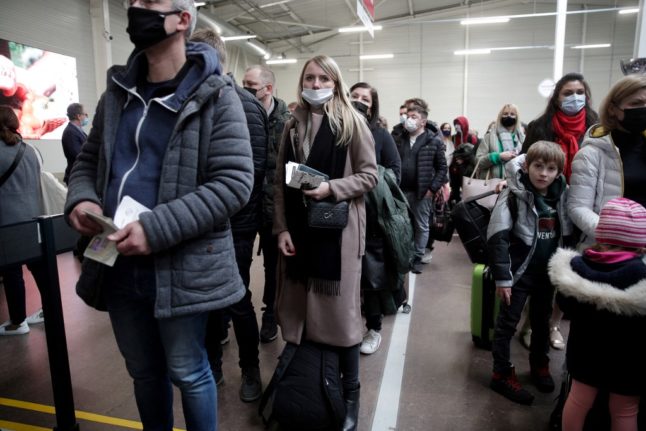It’s the height of summer and with fewer Covid-19 restrictions in both Spain and the United Kingdom, UK tourists are flocking back to their favourite overseas holiday destination: España.
In June 2022, 2.07 million UK holidaymakers visited Spain, despite the rise in flight prices and travel chaos (cancellations, delays, lost luggage) that has arisen as the world gradually returns to its usual fast pace.
But there’s something else now worrying UK tourists with flights booked for Spain – the apparent requirement to prove they have enough money to cover their Spanish holiday costs now that they are non-EU nationals.
Numerous UK newspapers, from The Telegraph to The Independent to of course The Daily Mail and The Sun, have been running articles warning UK holidaymakers that they could be turned away if they can’t show proof of having €100 (£85) for every day of holiday they are spending in Spain.
The Daily Express went with the headline “Fury as EU ‘punishes’ British holidaymakers – now UK tourists forced to pay to enter Spain”.
Radio station LBC ran with the equally over-the-top “Brexit fury: Tourists slam rule which requires Brits to have £85 to spend per day in Spain”.
So is there any truth to the dramatic warnings in the UK press?
Yes, it is theoretically true, but this is neither a new rule nor one that applies only to UK nationals, as much as some sectors of the UK press insist on making it all about Britons and alleged attacks on their freedoms.
As non-EU nationals who are not from a Schengen Area country either (the United Kingdom never was in Schengen), UK tourists entering Spain could have certain requirements with which to comply if asked by Spanish border officials.
These include rules relating to their passport validity, proof of a return ticket, documents proving their purpose of entry into Spain, limits on the amount of time they can spend in Spain (the 90 out of 180 days Schengen rule), proof of accommodation, a letter of invitation if staying with friends or family (another controversial subject when it emerged) and yes, proof of sufficient financial means for the trip.
READ MORE: What Britons could be asked to prove when visiting Spain
Third-country nationals who seek to enter Spain may need to attest to having at least €100 per day (£85), with a minimum of €900 (around £760) per person regardless of the intended duration of the stay. It is unclear whether this could also possibly apply to minors.
Is there actually any evidence of this happening?
No. There are no reports of UK tourists flying to Spain after becoming non-EU nationals and being turned away on the basis of not having the financial means to cover the expenses of their visit.
The only hiccups that have arisen post-Brexit have been at the land border between Gibraltar and Spain, with the case in 2021 of a UK national who was denied entry over a missing passport stamp, and in April of this year Spanish border officials tightening checks on UK nationals (non-residents in Spain) and Gibraltarians.
However, in the latter case travellers were reportedly asked to demonstrate both travel and accommodation plans before being allowed to enter Spain, nothing relating to financial means.
These issues may have come about as a result of political wrangling over ongoing negotiations on a deal outlining Gibraltar’s future relationship with the EU, and have nothing to do with UK tourists heading to Spain for a holiday.
There is some anecdotal evidence from other third-country tourists entering other EU/Schengen countries such as France suggesting that financial checks can happen but are rare. With millions of people travelling into the EU on a daily basis, how could there not be?
So all things considered, it’s been quite a stretch for UK newspapers to run these articles and refer to the financial means requisite as a “new rule”, one directed just at UK nationals and one drafted by the Spanish government. It’s not the first time this ‘news’ been in the British press either.
Some have linked to Spain’s Interior Ministry website but there is no evidence that the rules are any different to what they were a week ago, a month ago, or a year ago.
In fact, means of subsistence is regulated by Regulation (Ec) No 810/2009 of The European Parliament, introduced back in 2009.
Based on empirical evidence, it’s highly unlikely that UK tourists arriving in Spain will be asked to show proof of financial resources, but to be on the safe side they should have it available anyway.
After all, Spain may be less expensive than the United Kingdom but it isn’t that cheap. Some may say that if you don’t have more than £750, you shouldn’t really be going on holiday abroad.
You can prove your financial sufficiency through recent bank statements, a credit card, a banking app, cash, payslips, traveller’s cheques, supporting documents to attest your sponsor’s readiness to cover your costs, proof of prepaid accommodation and so on.
UPDATE: The Local Spain contacted the UK Embassy in Madrid regarding this matter. They replied saying that their team had slightly reworded their advice for UK nationals visiting Spain in a bid to further clarify the already existing rules.
“We wanted to clarify that there have been no changes to the guidance this summer,” The UK Embassy stressed on its Brits in Spain Facebook group.
“In summary, UK nationals entering the Schengen zone (in any country) as tourists may need to provide additional documents at the border.”



 Please whitelist us to continue reading.
Please whitelist us to continue reading.
Member comments